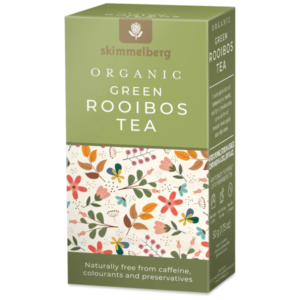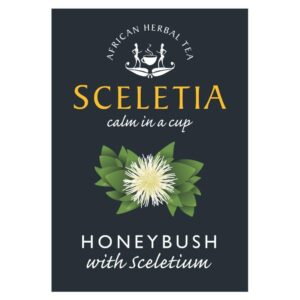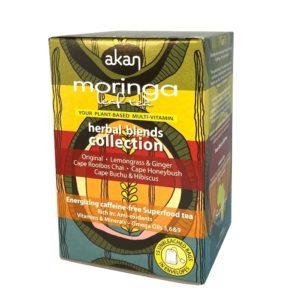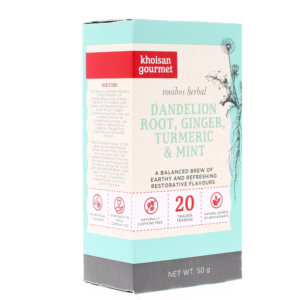Description
Yogi Tea Relax helps you to find tranquillity in the midst of these unsettled times, bringing the noise of the world to a halt and transforming agitation into serenity – this is what plants can teach us: The llinden flowers sway calmly in the trees. The camomile flowers greet us calmly from the meadows. The fruit of the fennel grow in peace and the sweet smelling seeds of the cardamom ripen quietly. Calmness and slowness with their wonderful herbs determine the life of all plants and the essence of this gentle tea.
The subtle message of this tea is: “Peace and stillness of the centre.”
Ingredients
Chamomile flowers*, fennel*, linden flowers*, cardamom*, barley malt*, hibiscus*, liquorice*, alfalfa*, raspberry leaves*, orange peel*, rose hips*, cinnamon*, ginger*, cloves*, black pepper*
Contains liquorice – people suffering from hypertension should avoid excessive consumption.
Brewing Suggestions
Pour 250 ml of freshly boiled water over the teabag. Allow to infuse for 5 minutes or longer for a stronger flavour
More about Yogi Tea Relax Ingredients
Linden flowers
Not only bees love them: Human beings have long valued the merits of lime blossoms. As a native to Europe, the tender flowers of the lime open in June. They exude an aromatic fragrance, taste slightly sweetish and contain valuable essential oils.
Chamomile flowers
It was sacred for the Teutons and the flower of Sun God Ra for the Egyptians: the white feathered chamomile with its brilliant yellow petals. Chamomile is an herbaceous plant, the typical fragrance of which everyone knows. Its flowers taste slightly bitter and pleasantly mild.
Rose hip
A member of the rose family, the rosehip has bright red fruit that contains many little nutlets. It thrives in the wild throughout all of Europe and Asia, preferable in a site with direct sunshine. Depending on when they are harvested, the taste of rosehips ranges from sourish-tart to slightly sweetish
Fennel
Fennel belongs to the umbellifer family and has been popular for thousands of years around the globe due to its intensive aroma. It originally came from the Mediterranean region. Its sweetish-spicy taste is slightly reminiscent of anise.
Barley malt
Barley belongs to the grass family. It is indigenous to the Middle East and the eastern part of the Balkans. In earlier times, barley malt was the only known sweetener – it tastes pleasantly malty and slightly like caramel.
Hibiscus
Hibiscus, which is sometimes given other names such as the rose mallow, originally came from the tropics. In addition to its beauty, it is now also valued for its pleasantly fruity, sweet-sourish tasting flowers. Thanks to its conspicuously large flowers, it can now be found in many European gardens
Liquorice
Liquorice has already been known since ancient times. Its sweetening power is about 50 times stronger than that of sugar. It tastes mild-sweetish and bitter-tart.
Alfalfa
Alfalfa is the Arabian word for the “father of all food”. Its flowering season is from June to September. The taste is subtly nutty and aromatic-spicy.
Raspberry leaves
The raspberry plant is a biennial bush, the berries of which should not be missing on any fruit plate. But not just the berries are worth harvesting: The green leaves of the raspberry bush have also been used since time immemorial to prepare hot beverages. Raspberry leaves taste slightly tart and delicately bitter.
Orange peel
The orange is the most frequently cultivated citrus fruit in the world. It originally came from Asia and was only introduced to Europe in the 15th century. Its peel contains numerous essential oils and the taste is similar to the fruit pulp in its fruitiness but not quite as sweet and slightly bitter.
Cinnamon
Cinnamon is among the most expensive spices in the world and was supposedly already used as a spice in China in 3,000 B.C. Cinnamon is extracted from the bark of the South-Asian cinnamon tree. It has an aromatic-sweetish taste and contains valuable essential oils.
Ginger
Whether in the Christmas biscuits, as a curry mixture or in lemonade: The bulbous ginger is among the best-known spice plants in the world. For thousands of years, it has been cultivated in the tropical heat of eastern Asia. It gives many of our YOGI TEA®s a fruity-hot and aromatically spicy taste.
Cloves
Cloves are the flower buds of the clove tree and primarily familiar as a spice for both sweet and salty food in the European part of the world. They belong to the myrtle family and have an intensive spicy aroma. They were even worth their weight in gold in both old China and Egypt.
Black pepper
Also called the “king of spices,” black pepper is one of the world’s most important spices in addition to salt. It originally came from the Indian Malabar Coast and tastes intensive-spicy, ranging from slightly spicy to quite spicy.








Reviews
There are no reviews yet.